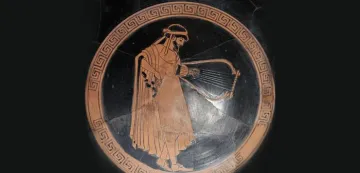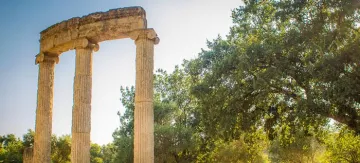8 things the Ancient Greeks would find weird about today's Olympics
First things first. Why all the clothes?

The Olympic Games of Ancient Greece were resurrected for the modern world during the summer of 1896 in Athens, Greece. Spectators clad in Victorian era frock coats, top hats, and cravats watched from the stands of the Panathinaiko Stadium as German wrestler Carl Schuhmann, in austere pants and a long-sleeved white shirt, shook hands with his Greek opponent Georgios Tsitas, wearing shorts and a tee-shirt, before their match.
John Bauschatz, associate professor of history and classics at the University of Arizona, says the Ancient Greeks would find this puzzling.
We're not nude. “They’d probably wonder why […] all the clothes, because they did their Olympics in the nude," he says. But that’s not all they’d find puzzling about the modern Olympics, according to Bauschatz.
We’re not honoring the gods. From their inception in 776 BC, the Olympic Games were held in honor of the gods. “This wasn’t just some secular competition where you compete and go home. There was a serious religious element to it and it was understood that the gods were connected to it,” says Bauschatz. He adds, “Nobody really knows where exactly [the Olympics] came from, but it seems there was some sort of mythological connection in the minds of the Greeks. The gods decreed that they had to happen, so they started happening.” Ancient Greek literature includes numerous references to this.

It’s just sports. The Olympics of Ancient Greece featured more than athletic events. It became a festival for the arts as well. “I think they’d wonder why there’s nothing but the athletics,” says Bauschatz. “One of the things I think people don’t realize necessarily about the ancient Olympics is that it wasn’t just sports. One of the main things was athletes competing for prizes and fame, and they had various events they could participate in, but it was also a cultural event. You would see poets, artists, musicians. They’d perform. They’d show off their stuff.”
Our Olympics last for several weeks. The ancient Olympics lasted just five days, according to Bauschatz.
Women compete. Women have been competing in the modern Olympic Games since 1900, when 22 women travelled to Paris, France and competed in five sports. Women did not compete in the ancient Olympics, with one sort-of-exception. “Women could own chariot teams,” says Bauschatz. If the chariot team she paid for won, the woman owner would receive the honor. He adds, “There were separate games just for women, but we don’t know much about them.”
The location changes. The ancient Olympics happened in the same place every four years: Olympia, a city in the southwest of Greece. Olympia was a religious site, and it had a sanctuary dedicated to Zeus, the Greek king of all gods, featuring a massive gold and ivory statue of his likeness. “It was a religious festival, so it was held at this place and the games are connected to it. The idea of it being a rotating festival like ours is just not something the Greeks would have even considered,” says Bauschatz.

Personal glory for athletes is important. “I think they’d probably find our Olympics kind of selfish,” says Bauschatz. “It’s less about the pride of a country or a city and more about the individual pride of an athlete.” It’s not uncommon for modern athletes to compete as “carpetbaggers,” seeking a win for a foreign country. In 2014’s Winter Olympics in Sochi, several athletes, including Hubertus Von Hohenlohe, Vanessa-Mae Vanakorn Nicholson, and Gary di Silvestri, did just this. In Ancient Greece, this would not have been nearly as common, according to Bauschatz. The Olympics were “a big deal for city states. They wanted people to go to get their state on the map.”
Our sports aren’t gruesome. Much like the modern Olympics, the ancient Olympics featured sports like wrestling, boxing, and track and field. “But then there were a number of much more violent sports,” says Bauschatz. The Pankration was one such violent sport, wherein athletes would beat their opponent into submission using, basically, any means necessary. “It’s basically MMA with fewer rules. You would just go until one person couldn’t continue or was dead. It was a more militaristic society and the possibility of death is more of a reality for the Greeks than for 21st century Americans. War and death were facts of everyday life.”

